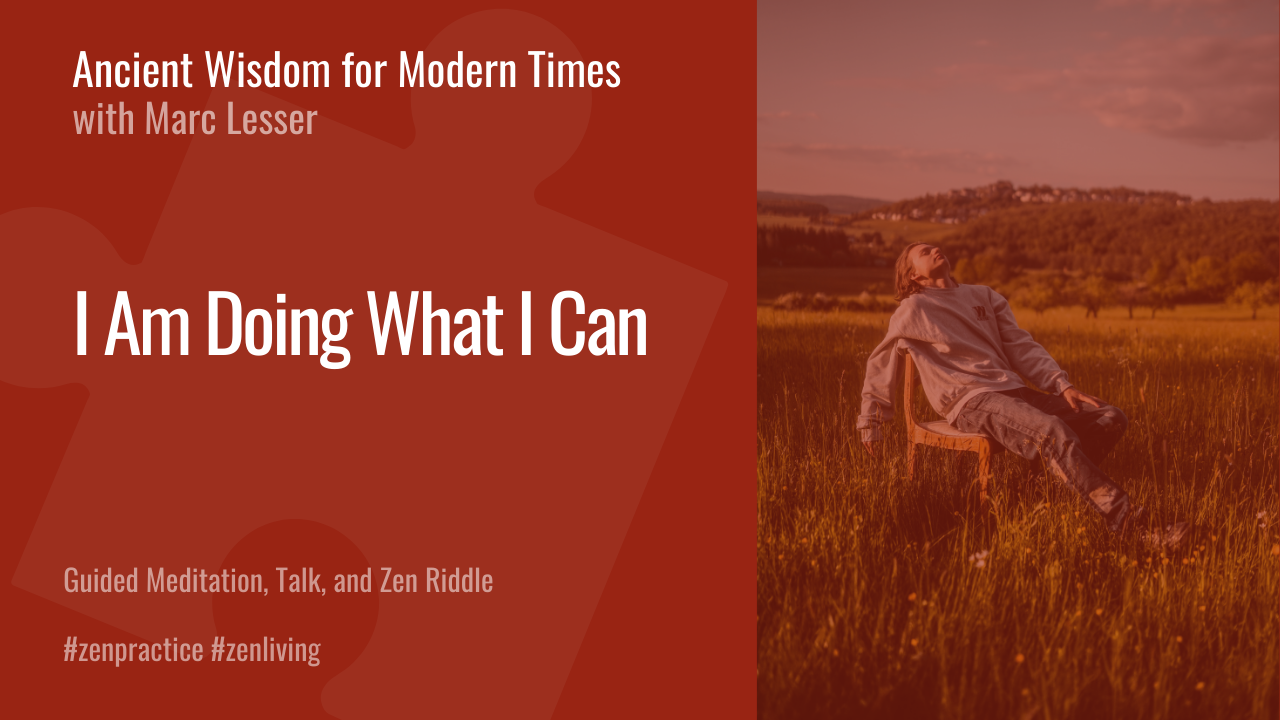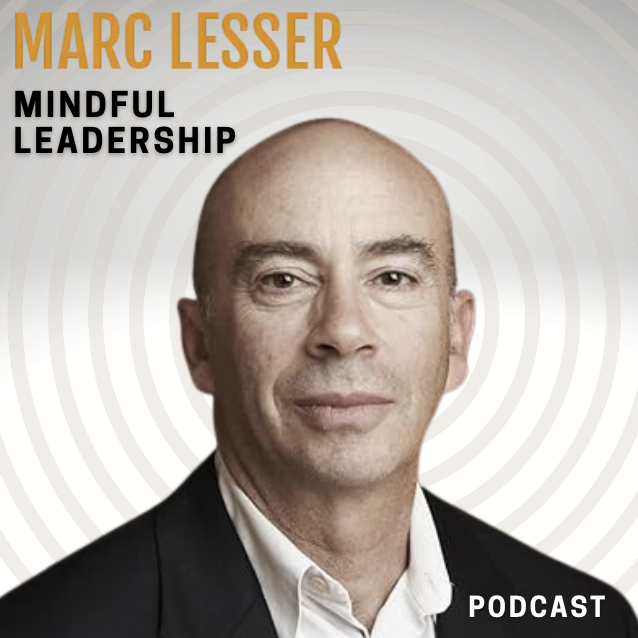I’m doing what I can is today’s episode. We begin with a short guided meditation. Then I give a short talk about pessimism, optimism, grief, and joy, and address ways of cutting through the dualities of our modern life and doing what we can, with spaciousness and possibility.
Today’s Zen puzzler is Pai Chang’s fox, a traditional Zen koan, about not avoiding cause and effect, or finding our freedom while being fully immersed in the world.
<iframe title=”I Am Doing What I Can: Guided Meditation, Talk and Zen Puzzler” allowtransparency=”true” height=”150″ width=”100%” style=”border: none; min-width: min(100%, 430px);height:150px;” scrolling=”no” data-name=”pb-iframe-player” src=”https://www.podbean.com/player-v2/?i=8fpmk-14aede2-pb&from=pb6admin&share=1&download=1&rtl=0&fonts=Arial&skin=1&font-color=&logo_link=episode_page&btn-skin=c73a3a” loading=”lazy”></iframe>
EPISODE TRANSCRIPT
Marc Lesser: Welcome to Zen Bones. This is Marc Lesser. Zen Bones is a biweekly podcast, featuring conversations with leading teachers and activists, and an exploration of Zen teachings and practices. Please support our work by making a donation at marclesser.net/donate.
[music]
I’m Doing What I Can, is today’s episode. We begin with a short guided meditation, and then I do a short talk about pessimism and optimism, grief and joy, and cutting through the dualities of our modern world and life, and doing what we can with spaciousness, and with possibility. Today’s Zen puzzler is a traditional Zen kōan called Pai-chang’s fox, and it’s about not avoiding cause and effect, and finding our freedom right in the midst of being fully immersed in this world, by doing what we can. I hope you enjoy today’s episode.
[music]
Let’s begin by doing a few minutes of sitting practice together.
[music]
[pause 00:01:30]
Gently, bringing attention to the body, and relaxing the jaw, relaxing the muscles in the face, opening the chest and shoulders, and being embodied, feeling our bodies. If there’s any place where there’s any tension or holding, giving that some attention. Relaxing and using the breath as a focal point, and anchor as well. Yes, breathing in, I know that I’m breathing in. Breathing out, I know that I am breathing out.
[silence]
This approach and attitude of a nothing, and nothing to accomplish. What a relief, nothing to accomplish right now. Now, there’ll be plenty of time later for accomplishing, but for now, I’m letting it all go. Yes, with each exhale, a little bit more relaxed, and a little bit more alert at the same time. This practice is about waking up, letting go of our usual judgments, and limitations, criticisms.
[pause 00:04:00]
Yes, I was feeling a little unmoored this morning, and it’s okay. Sometimes, as we feel the changes, a little bit less holding on, a little bit more of letting go.
[pause 00:04:52]
Letting thoughts, of course, letting thinking mind to do its thing, but no need to follow patterns of thinking, and gently coming back to the breath, to the body.
[pause 00:05:34]
Yes, no other time than right now. No other time, and no other place than right here. The whole world is right here, and nowhere to go. Nothing that needs changing, or that needs to be accomplished. [silence] Allowing a sense of acceptance and love, self-love, and love for the people in our lives. Both giving and receiving. Becoming more and more receptive with each breath, and keeping it simple, just breathing in, and breathing out here, alive.
[pause 00:07:19]
I’m going to ring the bell, and change gears, but you can feel free to continue with this practice of just sitting.
[pause 00:07:45]
[bell rings]
[music]
I want to talk about, I’m Doing What I Can. Only this line from Rumi [unintelligible 00:08:30] just came into my mind, “Let the beauty be what you do. Yes. It’s okay to kneel and kiss the ground.” Feeling the beauty of being alive. I notice these days, living in the world on my own, I’m reading a lot. I’m writing a lot. I sometimes feel angry. I sometimes feel happy. I’m grieving. I’m doing what I can to take care of myself.
Sometimes I’m quite pessimistic about things. Sometimes I’m quite optimistic about things, and I’m– At the heart, I’m doing what I can do, and I hope that you are too. There’s so much to be upset or angry about. The thinking of the racism, young Black men being needlessly harmed. What seems like the endless gun violence, and the silence, and lack of courage of our leaders. Easy to be angry or frustrated about so many of our systems, our financial systems, our food systems, our financial systems.
Again, what a world that we live in. Sometimes, I am aware of my own sense of grieving. Grieving for our country that refuses to engage with our history, and refusing to find ways to fully acknowledge and embrace, and heal. Sometimes grieving for how some companies treat their employees, the power of greed, the loss of community, the loneliness, and I’m doing what I can.
One of the things that I’m doing a lot of is reading. I’ve been studying Zen Mind, Beginner’s Mind by Shunryū Suzuki. Coming back to that book again and again about the power of meditation, and non-duality. I’m reading a book called These Truths by Jill Lepore. I’m actually re-reading this book for the third time. It’s a book about American history through the lens of greed and hate and delusion, as well as love and compassion, and possibility.
I’ve been reading a book called Vasubandhu’s “Three Natures”, Vasubandhu, a Zen teacher in India from the 1st or 2nd century. It’s a deep and mysterious, and practical text, again, about cutting through the dualities of this and that, of holding on, and letting go, of success and failure. Then, there’s my daily habit of reading The New York Times, and The Washington Post, and The Wall Street Journal.
I love this combination of starting my day with meditation practice, clearing the decks, clearing the way. Then, stepping into the world of what’s happening in our world, what’s happening in my own life, and doing what I can to take care of myself. I generally like to start every day with some stretching and exercise after my morning meditation. I like to go for a four to five-mile walk each day.
I love my practice of cooking, and enjoying having meals with family and friends. I meet each month with a group of my peers. It’s a group of CEOs that’s been meeting for about 15 years. Important to have an ongoing peer group. I’m really good at my practice of sleep, making sure that I get my seven, seven and a half hours of sleep every night. I also try to make sure to have ongoing connective conversations with family and friends.
With all of that, I sometimes feel quite pessimistic. It doesn’t take much to be alarmed by what’s happening in our world. Again, I think of what I’ve been calling my inner Homer Simpson, right? The, “Why does everything have to be so hard? Why does everything have to be so hard? Why is change and healing, positive change healing, why is it so difficult?”
At the same time, I notice, I can’t help but be optimistic, feeling some passion and creativity about people doing amazing things all around me, the work that’s happening. Slowly, of course, around healing and racism, and climate change, the amazing things happening in the world of music, in socially responsible business. I’ve been doing some work.
I’m preparing right now for a retreat that I’m helping to lead of wildland firefighters, these young elite athletes, who have devoted their lives to helping through working skillfully with fires in the world of socially responsible business that I course in, and I feel inspired and optimistic by the creative and amazing things that I see. I’m doing what I can. I attempt to keep an attitude and approach of possibility, transforming difficulty and pain and challenges into possibility, in my writing, in my teaching, in my Zen group.
Though, it often doesn’t quite feel enough, I keep coming back to, I’m doing what I can with anger, with grieving, with reading, with self-care, sometimes pessimistic, more often optimistic. I hope that you are doing what you can. I hope that you are taking care of yourself. I think of a beautiful poem that epitomizes self-care and well-being called the Song of the Grass-Roof Hermitage by Zen teacher Shitou, who lived in China during the ninth century.
The poem is in a book called Inside the Grass Hut. It’s a translation book by Ben Connolly, in which the first two lines are, “I’ve built a hut where there’s nothing of value. After eating, I relax, and enjoy a nap.” Then, the last portion of the poem says, “Let go of hundreds of years, and relax completely. Open your hands, and walk innocent. Thousands of words, myriad interpretations are only to free you from obstructions.”
Let go of hundreds of years, and relax completely. Open your hands and walk, walk with innocence. Thousands of words and myriad interpretations, they’re only there to free you from obstructions. I suspect that life in ninth-century China was immensely challenging and stressful. I love Shitou’s advice of napping, relaxing, opening our hands, walking with innocence.
I appreciate how he frames living our lives as one interpretation after another, and finding freedom from these obstructions. I think one of the key practices here in, I’m doing what I can and we are all doing what we can, I hope, is seeing what is, and feeling a sense of spaciousness, practicing spaciousness and possibility. Sometimes we need to work with a sense of focus and urgency.
Even then, even is it possible? I used to feel that, especially, in my time working in the Zen kitchen with a sense of urgency and focus. At the same time, there was a sense of spaciousness, just doing what I could do in that moment. This image of making an offering, this image of producing great meals, and coming back to the spaciousness of body, breath, mind. Staying optimistic in the midst of the stresses and challenges of our daily lives, doing what we can with spaciousness.
[music]
Welcome to the Zen Bones puzzler, where I will regularly be presenting a story, or a Zen kōan or a poem. Something to contemplate, to think about, a story that has purpose. It’s about developing greater insight and reflection. Not so much for a solution, but as a way to support your practice, a meditation in daily life.
[music]
I’m happy to introduce today’s Zen puzzler. Again, these are my taking some traditional and non-traditional Zen stories, and using them as a way to support us, help us in our daily lives in this modern world. A friend asked me this morning, “What is a Zen kōan anyhow?” I said that these are– Traditionally, there are several collections of Zen stories. Mostly, the traditional Zen stories come from sixth, seventh, eighth, ninth-century China, the height in Tang Dynasty China.
There is a whole school of Zen, the Rinzai. Rinzai tradition that uses these kōans very formally actually as the path toward awakening. Essentially, these are stories or dialogues that are with the aim of helping us cut through the dualistic world of this or that, of life and death, of success and failure, cutting through how easily we get caught. Also, I think they are meant to bring us deeply into our heart center, getting out of our intellectual way of seeing things, and entering our hearts, which again, it’s really my hope and aspiration for this podcast and these talks.
Zen Bones, ancient wisdom for modern times. Today’s Zen puzzler comes from a very traditional kōan called Pai-chang’s fox. It’s a long story, but the key to it is this, I think somewhat renowned Zen teacher is asked, it’s I think probably after he gives a traditional Zen lecture. Someone asks him, “Does a fully enlightened person fall under the law of cause and effect or not? Is a fully enlightened person, do they still live in the world of cause and effect? The world of karma, the world of influence, being influenced, and influencing?”
In this case, the teacher says, “No, a fully enlightened person is no longer subject to cause and effect.” This story is that, this person is turned into a fox, and apparently, in China during this time, this was not a good thing. This was a very punishing negative consequence of saying that a fully enlightened person is not subject to cause and effect.
One of the commentaries, a verse in this particular kōan, the person who’s collecting the story says, “Not falling, not evading, two faces of the same die. Not evading, not falling, a thousand mistakes, ten thousand mistakes.” Then, at some point in this story, the same teacher somehow is given another chance, and is asked to answer this question.
This time, he says, “Yes.” When asked, does a fully enlightened person come under the subject to cause and effect? He is released from the body of a fox, and he comes back to being himself in the human form as a Zen teacher. I think this is very much connected to the topic here of, I’m Doing What I Can, and that we live in this crazy mixed-up world, where there are so many difficult, often horrible things happening, so many ways to get caught from our– Whether it’s our gender, or our ethnic background, or our politics, our views, our views about things.
I think this story is saying, we have to somehow take on and integrate all of the things in our world, all of the things in our relationships. I’ve often heard people say, “If you want to see how someone’s Zen practice is going, ask their wife, or their husband, ask their children.: That we can’t help living in this human world of cause and effect, of influencing and being influenced, and somehow, finding the freedom and spaciousness, and possibility right in the midst of working with all of the causes and effects of all parts of our lives.
Finding freedom, finding spaciousness, cutting through, finding our real positive power, positive influence, right in the midst of living fully, fully with our families, with our friends, with our work, with our communities. Finding freedom right in the midst of the world of cause and effect.
[music]
I hope you’ve appreciated today’s episode. To learn more about my work, and my new book, Finding Clarity, you can visit marklesser.net. This podcast is offered freely, and relies on the financial support from listeners like you. Please donate at marklesser.net/donate. Thank you very much.
[music]
[00:27:28] [END OF AUDIO]









